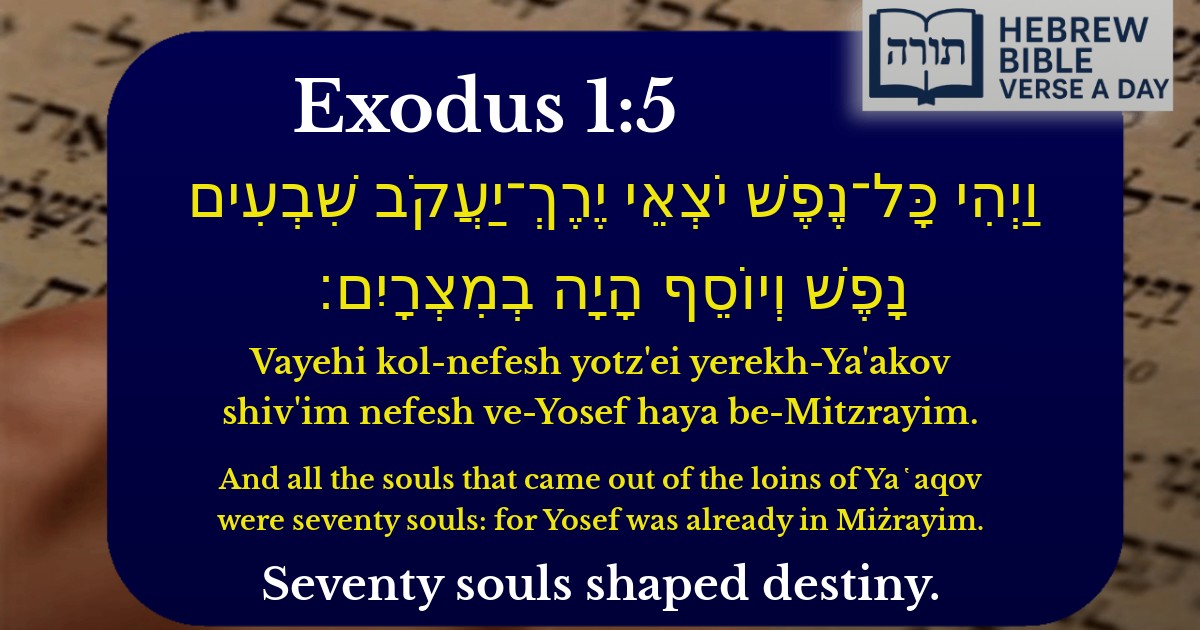Join Our Newsletter To Be Informed When New Videos Are Posted
Join the thousands of fellow Studends who rely on our videos to learn how to read the bible in Hebrew for free!
Hebrew Text
וַיְהִי כָּל־נֶפֶשׁ יֹצְאֵי יֶרֶךְ־יַעֲקֹב שִׁבְעִים נָפֶשׁ וְיוֹסֵף הָיָה בְמִצְרָיִם׃
English Translation
And all the souls that came out of the loins of Ya῾aqov were seventy souls: for Yosef was already in Miżrayim.
Transliteration
Vayehi kol-nefesh yotz'ei yerekh-Ya'akov shiv'im nefesh ve-Yosef haya be-Mitzrayim.
Hebrew Leining Text
וַֽיְהִ֗י כׇּל־נֶ֛פֶשׁ יֹצְאֵ֥י יֶֽרֶךְ־יַעֲקֹ֖ב שִׁבְעִ֣ים נָ֑פֶשׁ וְיוֹסֵ֖ף הָיָ֥ה בְמִצְרָֽיִם׃
Parasha Commentary
📚 Talmud Citations
This verse is quoted in the Talmud.
📖 Sotah 36b
The verse is cited in a discussion about the number of Jacob's descendants who went down to Egypt, emphasizing that Joseph was already there.
📖 Megillah 13a
The verse is referenced in the context of discussing the exile to Egypt and the significance of the number seventy.


The Significance of Seventy Souls
The verse (Shemot 1:5) states that the total number of Yaakov's descendants who descended to Egypt was seventy souls, with Yosef already being in Egypt. Rashi explains that this number is derived from the enumeration in Parshat Vayigash (Bereishit 46:27), where the Torah lists the names of Yaakov's descendants. The number seventy holds deep significance in Jewish tradition, symbolizing completeness and the foundation of the Jewish nation.
Yosef's Presence in Egypt
The phrase "וְיוֹסֵף הָיָה בְמִצְרָיִם" ("and Yosef was already in Egypt") is noted by the Ramban (Nachmanides) as emphasizing that Yosef was not counted among the seventy souls because he had already been in Egypt for many years. This exclusion highlights his unique role as the one who prepared the way for the family's descent and eventual settlement in Egypt.
Midrashic Insights
The Midrash (Shemot Rabbah 1:5) elaborates on the number seventy, connecting it to the seventy nations of the world (based on Bereishit 10). This parallel suggests that the Jewish people, though small in number, were destined to influence all nations. Additionally, the Midrash teaches that the seventy souls correspond to the seventy elders who would later lead Israel, symbolizing the spiritual leadership that would emerge from Yaakov's descendants.
Theological Implications